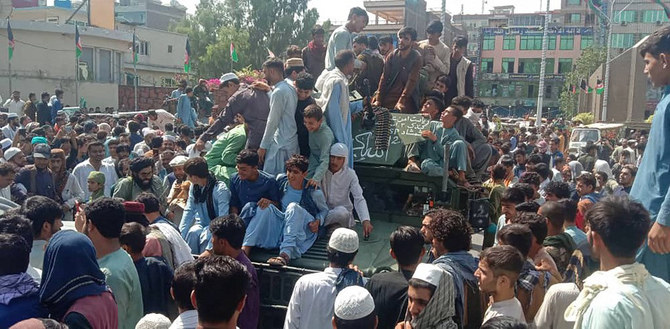DUBAI: After being denied a share of power for almost 20 years, the Taliban has regained its political footing in one fell swoop, dislodging the government from the few provinces over which it held sway before entering the capital Kabul.
On Sunday, its fighters claimed they had seized the key city of Jalalabad in the east and the adjacent areas of Laghman and Maidan Wardak, about 20 km to the west of Kabul. The last pockets of resistance in Mazar-i-Sharif had been crushed by the Taliban the previous night. By dusk on Sunday, the hardline Islamist group had more areas under its control than ever before.
With the latest sweep, which followed on the heels of a surge in attacks, the Taliban controls all key border crossings of Afghanistan with neighboring countries. Besides Kabul, they have captured all major cities and most of the airports.
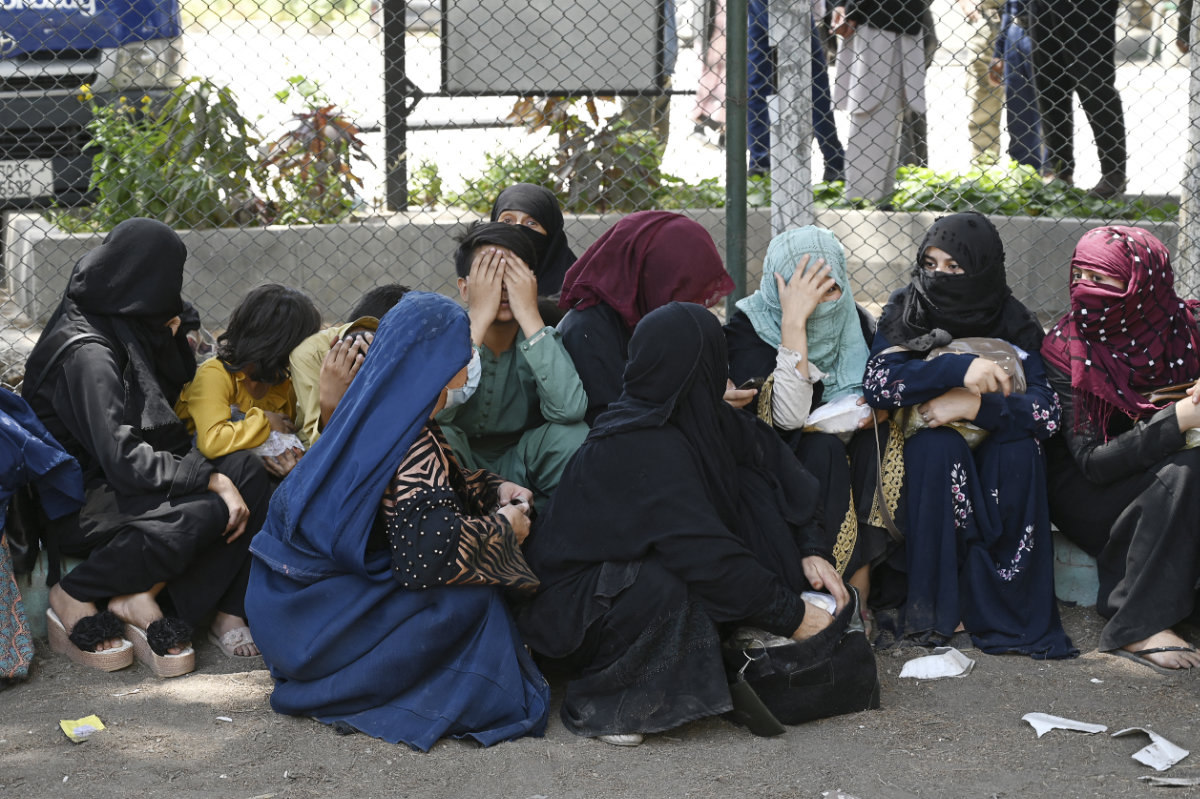
Afghan families, who fled from Kunduz and Takhar province due to battles between Taliban and Afghan security forces, sit at the Shahr-e-Naw Park in Kabul on August 10, 2021. (AFP)
Middle-class, educated Afghans have been gripped by a mix of feelings — uncertainty, panic, terror, pessimism and even optimism — as the US prepares to abandon the country to its once and future rulers. Older Afghans have bitter memories of the Taliban’s puritanical policies during its rule from 1996 to 2001.
Opinion
This section contains relevant reference points, placed in (Opinion field)
The group’s promises of a new era of peace have yet to be tested. Zabihullah Mujahid, its spokesman, said the group ordered its fighters to enter Kabul on Sunday to prevent looting as policemen had left their posts empty. “The Mujahidden of the Islamic Emirate has no intention of entering Kabul by force or war, but is holding talks with the other side for a peaceful entrance to Kabul,” he said.
He did not explain who the “other side was” but assured Afghans that “life, honor and property of people will be protected” before ordering the Taliban to “remain at the gates of Kabul and avoid revenge.”
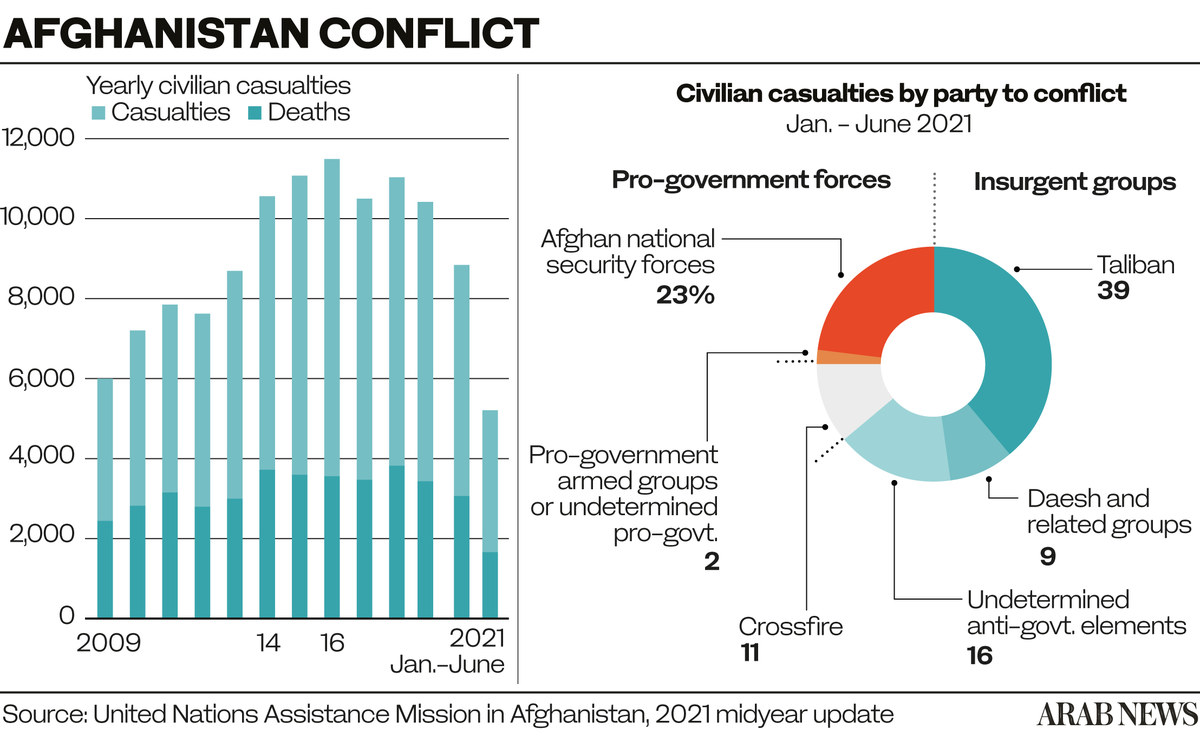
Abdul Sattar Mirzakawal, Afghanistan’s acting interior minister, said in a video message that talks were underway on the formation of a transitional government.
“The people of Kabul should not worry, the city is secure. Whoever causes disorder will be dealt with decisively. The security of the city is guaranteed, the city will not be attacked … and the deal is to transfer power peacefully to the leadership of a transitional administration. Kabul is safe, be assured,” Mirzakawa said in a recorded speech.
Since the Taliban now have the upper hand, they are expected to decide what the next government will look like. Two Taliban officials told Reuters news agency there would be no transitional government and that the group expected a complete handover of power.
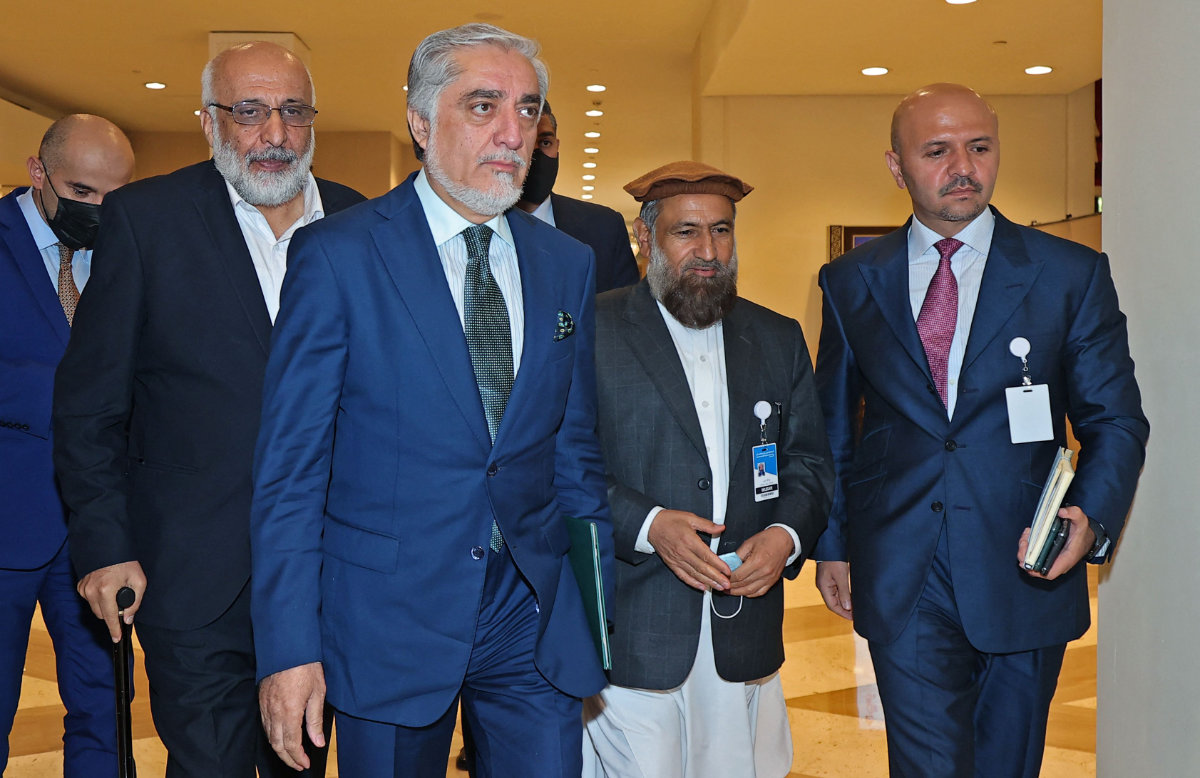
Abdullah Abdullah (center, front), head of Afghanistan's high Council for National Reconciliation, walks down a hotel lobby during the talks in Qatar's capital Doha on August 12, 2021. (AFP)
Earlier on Sunday, Abdullah Abdullah, the head of the Afghan National Reconciliation Council, announced that President Ashraf Ghani left the country as the Taliban circled the outskirts of Kabul.
“The former Afghan president has left the nation,” AFP quoted Abdullah as saying.
While an eventual takeover of the country by the Taliban was widely expected, what caught everyone by surprise was the speed of the government’s capitulation. Without the military support of the US and NATO, senior officials of the Afghan Armed Forces evidently reckoned they were fighting a losing battle.
“People think like other parts of the country, the Taliban will take Kabul too because morale is low among troops, people are tired of war and the soldiers are not willing to sacrifice their lives for the corrupt leaders of Kabul,” retired Col. Mohammad Hassan, a security analyst, told Arab News.
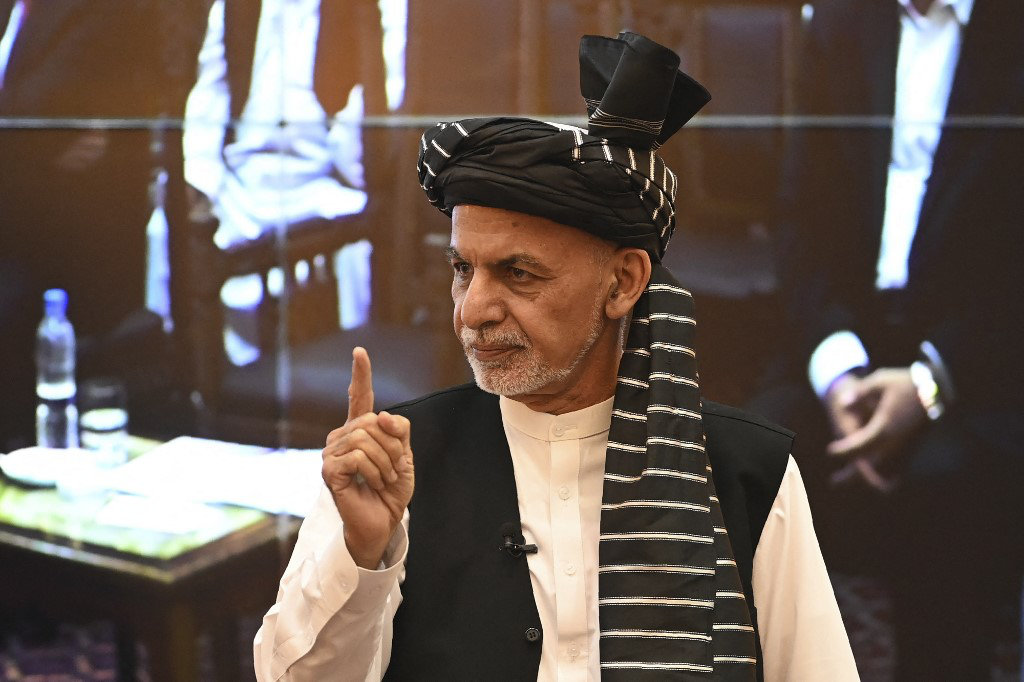
Afghanistan's President Ashraf Ghani was forced to flee Kabul as Taliban forces captured the capital on August 15, 2021. (AFP)
On Saturday, a defiant President Joe Biden released a statement defending and explaining the withdrawal from Afghanistan. “An endless American presence in the middle of another country’s civil conflict was not acceptable to me,” he said.
Speaking to reporters at the White House days before that, he said the US was keeping the commitments it had made to Afghanistan, such as providing close air support, paying military salaries and supplying Afghan forces with food and equipment.
“They’ve got to fight for themselves,” Biden said.
However, the haste with which US forces pulled out was viewed by politicians and ordinary people as an insult to the country, especially after the sacrifices both Americans and Afghans had made in blood and treasure for two decades.
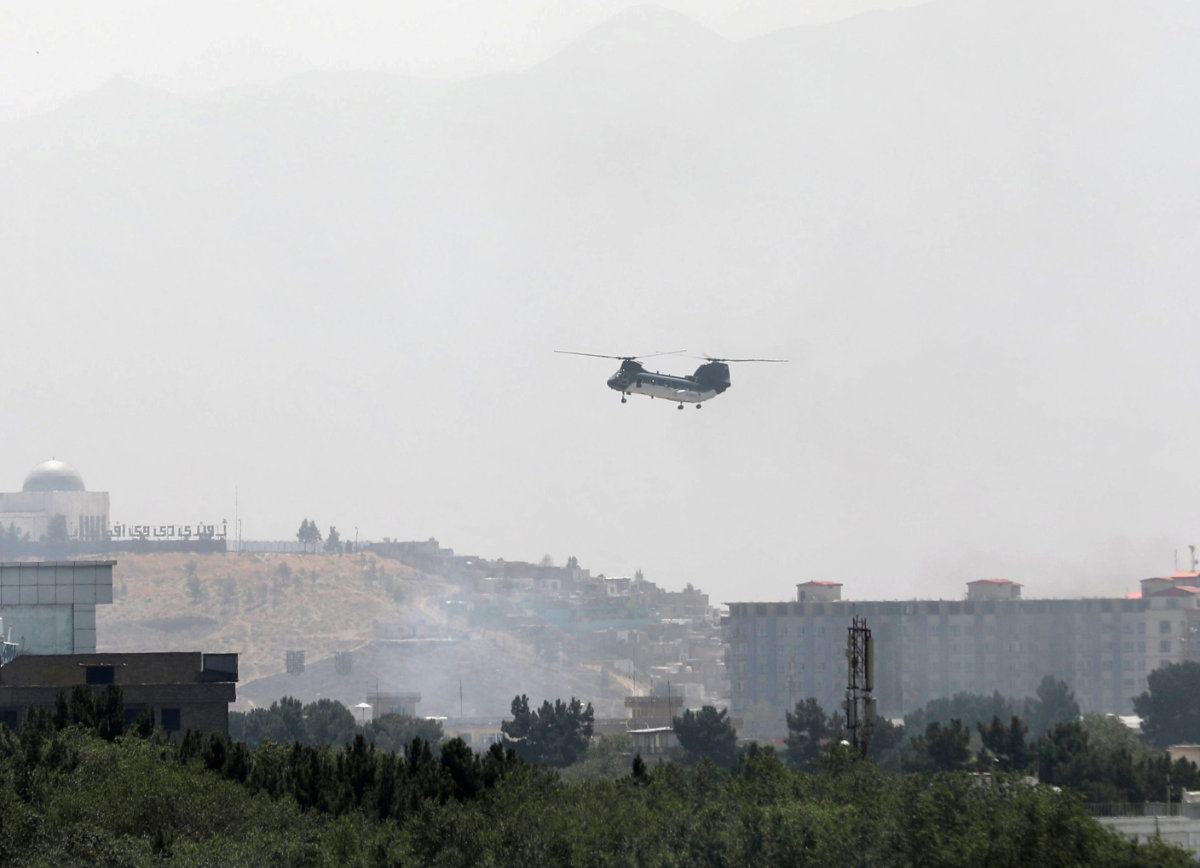
A US CH-46 Sea Knight military transport helicopter flies over Kabul on August 15, 2021 to evacuate US embassy staff. (REUTERS/Stringer)
A wartime Afghan interpreter who worked for Washington told the BBC the US “turned its back” on him. The man, whose name was changed for security reasons, said: “The president of the US said, ‘as you stood with us, we will stand with you.’ So right now, where are they? There’s no mercy for the linguists. The Taliban has said before, interpreters were the eyes and ears of the Americans — so the punishment will be different for us.”
He said although his services had saved numerous American lives, his application for a US visa in 2016 was rejected due to “lack of faithful and valuable service.”
The sense of betrayal and abandonment is not confined to people who served the coalition forces. Abdul Bostani, who left Afghanistan as a teenager to flee from the Taliban, said the world has turned its back on the Afghans.
“The international community … promised (the) people of Afghanistan a safe and secure country 20 years ago, but we’ve been let down and this will have serious consequences to the rest of the world,” he said.
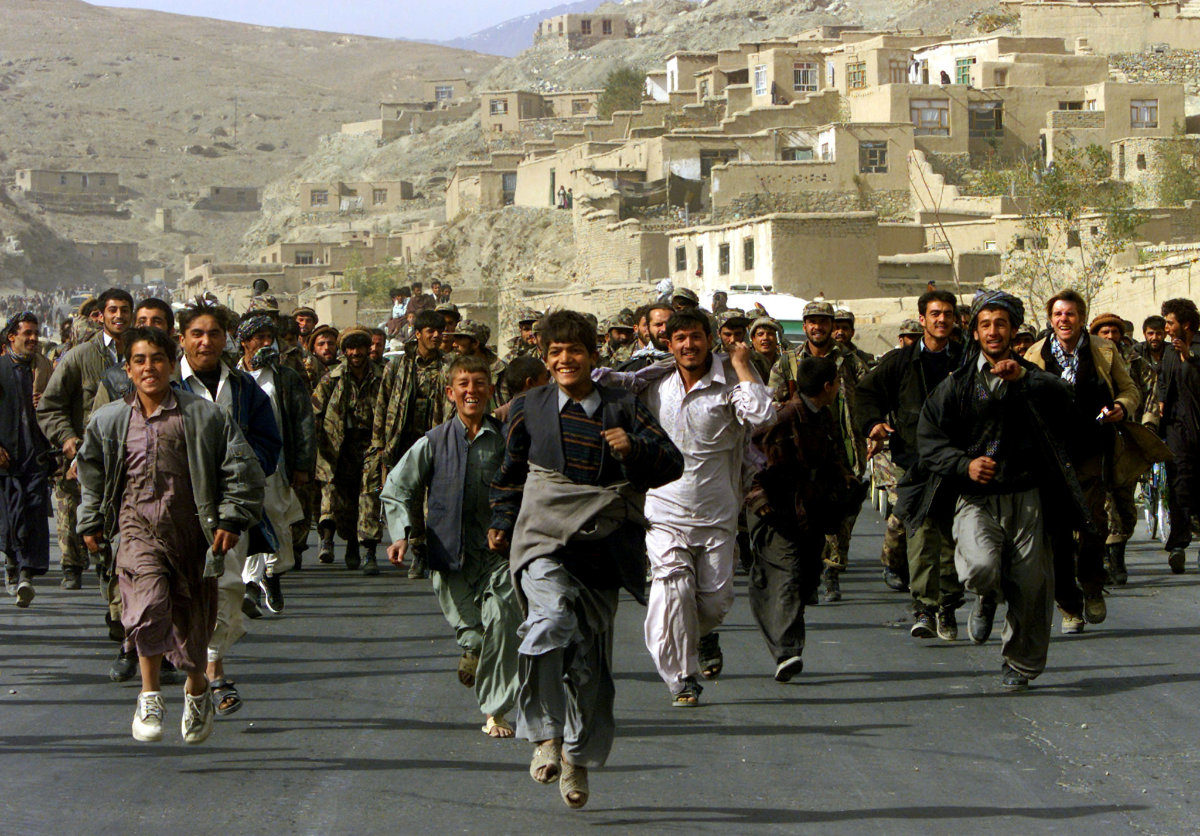
Residents of Kabul celebrate and escort Northern Alliance fighters entering the Afghan capital Kabul, Afghanistan, on November 13, 2001. (REUTERS/File Photo)
In recent days, social media posts showed citizens and residents of Kabul lining up outside banks, foreign embassies and in visa processing offices in an attempt to flee the country before the Taliban closed in.
Nepal appealed for the evacuation of an estimated 1,500 citizens working as security staff with embassies and aid groups in Afghanistan.
Meanwhile, Western countries ramped up efforts to evacuate their representatives from the country. The US Embassy in Kabul sent a security alert on Sunday warning that the situation in the capital, including at the airport, was unstable.

Members of the 16 Air Assault Brigade arrive in Kabul as part of a 600-strong UK-force sent to assist the rescue of British nationals in Afghanistan. (MoD via AP)
“There are reports of the airport taking fire; therefore we are instructing US citizens to shelter in place,” the embassy said.
Madeleine Albright, who served as the first female US secretary of state from 1997 to 2001, said saving lives has to take priority.
“We must focus on saving lives in Afghanistan. As the US works to evacuate those at special risk from the Taliban, I am grateful to Albania, Canada, Kosovo and North Macedonia for offering refuge to Afghan allies, esp women & civil society leaders. I hope & expect others to follow,” Albright said on Twitter.
Malala Yousafzai, the Pakistani Nobel laureate who was shot by a Taliban gunman in 2012, echoed Albright’s concerns. “We watch in complete shock as Taliban takes control of Afghanistan. I am deeply worried about women, minorities and human rights advocates. Global, regional and local powers must call for an immediate ceasefire, provide urgent humanitarian aid and protect refugees and civilians,” she said.
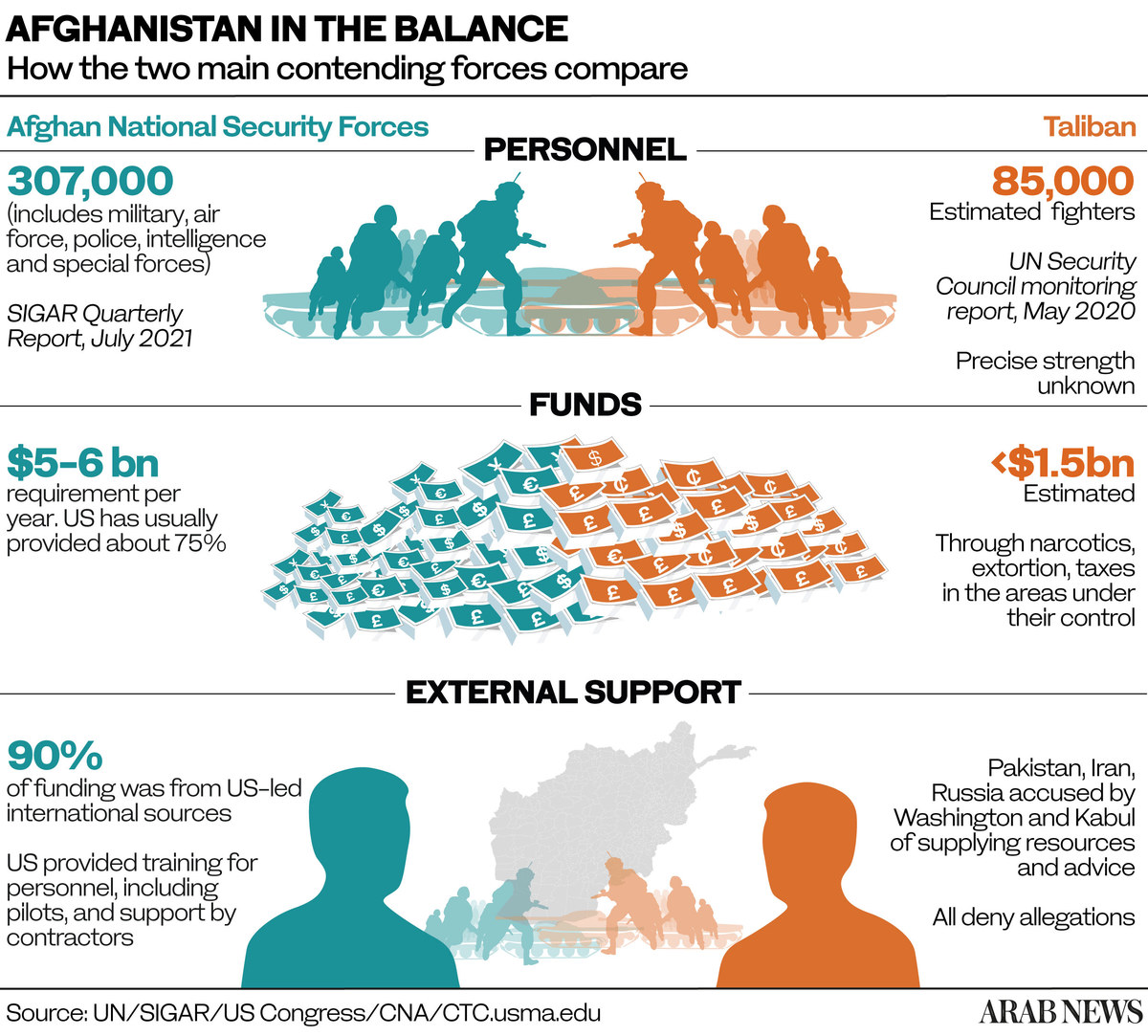
Some regional powers, it seems, have reached a modus vivendi with the Taliban. China has received a Taliban delegation. Uzbekistan, Iran, Russia and Pakistan have welcomed the Taliban’s return to Kabul in what they referred to as a peaceful manner, and willingness to share power with other political actors.
The Biden administration believes that its concerns in Afghanistan have been addressed to the extent that Taliban leaders have pledged not to allow any militant group to use Afghan territory against Washington or any other country in the world.
The US presumably believes it has achieved its goals and will be able to deal with any future government in Kabul that does not threaten its interests, even if it does not comply with international conventions on human rights any more than the regimes in North Korea, Myanmar and Iran do.





